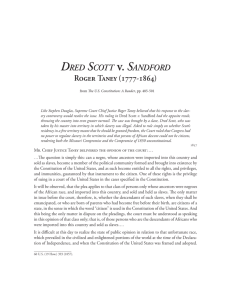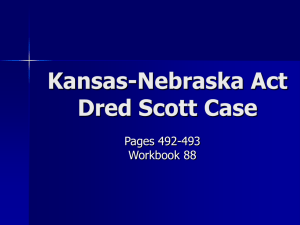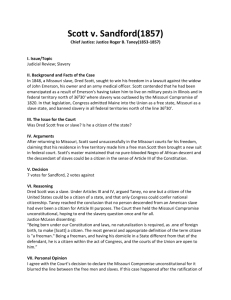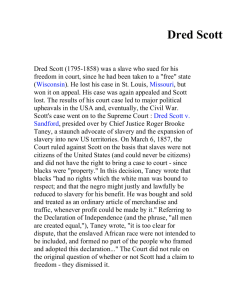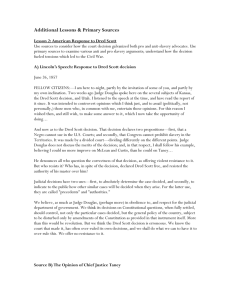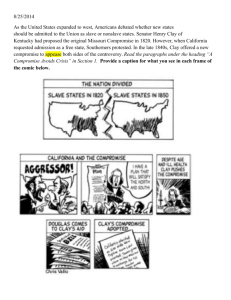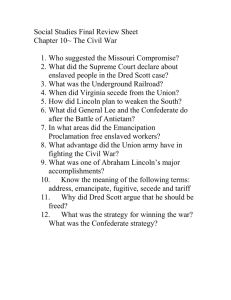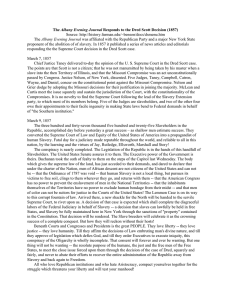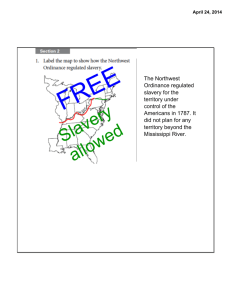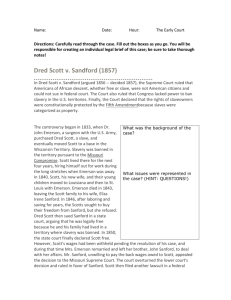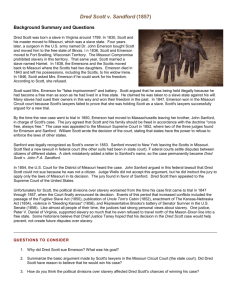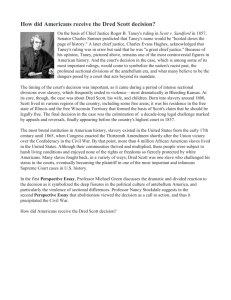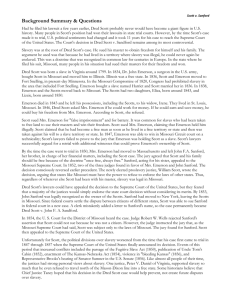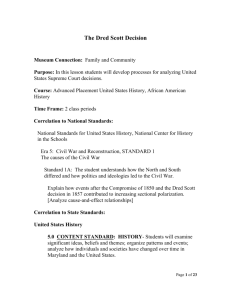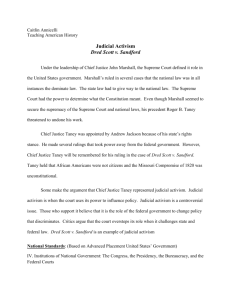Dred Scott v. Sandford
advertisement
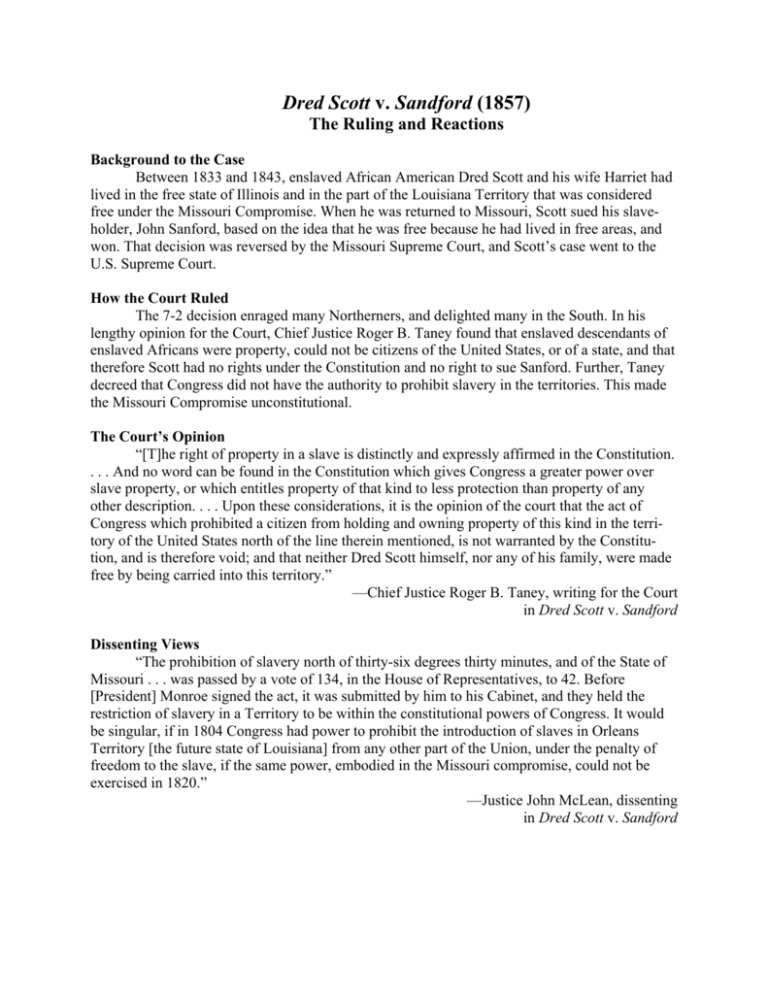
Dred Scott v. Sandford (1857) The Ruling and Reactions Background to the Case Between 1833 and 1843, enslaved African American Dred Scott and his wife Harriet had lived in the free state of Illinois and in the part of the Louisiana Territory that was considered free under the Missouri Compromise. When he was returned to Missouri, Scott sued his slaveholder, John Sanford, based on the idea that he was free because he had lived in free areas, and won. That decision was reversed by the Missouri Supreme Court, and Scott’s case went to the U.S. Supreme Court. How the Court Ruled The 7-2 decision enraged many Northerners, and delighted many in the South. In his lengthy opinion for the Court, Chief Justice Roger B. Taney found that enslaved descendants of enslaved Africans were property, could not be citizens of the United States, or of a state, and that therefore Scott had no rights under the Constitution and no right to sue Sanford. Further, Taney decreed that Congress did not have the authority to prohibit slavery in the territories. This made the Missouri Compromise unconstitutional. The Court’s Opinion “[T]he right of property in a slave is distinctly and expressly affirmed in the Constitution. . . . And no word can be found in the Constitution which gives Congress a greater power over slave property, or which entitles property of that kind to less protection than property of any other description. . . . Upon these considerations, it is the opinion of the court that the act of Congress which prohibited a citizen from holding and owning property of this kind in the territory of the United States north of the line therein mentioned, is not warranted by the Constitution, and is therefore void; and that neither Dred Scott himself, nor any of his family, were made free by being carried into this territory.” —Chief Justice Roger B. Taney, writing for the Court in Dred Scott v. Sandford Dissenting Views “The prohibition of slavery north of thirty-six degrees thirty minutes, and of the State of Missouri . . . was passed by a vote of 134, in the House of Representatives, to 42. Before [President] Monroe signed the act, it was submitted by him to his Cabinet, and they held the restriction of slavery in a Territory to be within the constitutional powers of Congress. It would be singular, if in 1804 Congress had power to prohibit the introduction of slaves in Orleans Territory [the future state of Louisiana] from any other part of the Union, under the penalty of freedom to the slave, if the same power, embodied in the Missouri compromise, could not be exercised in 1820.” —Justice John McLean, dissenting in Dred Scott v. Sandford Opposition to the Ruling New York Tribune: ". . . This decision, we need hardly say, is entitled to just so much moral weight as would be the judgment of a majority of those congregated in any Washington bar-room. . . . "This judgment annihilates all Compromises and brings us face to face with the great issue in the right shape. Slavery implies slave laws—that is, laws sustaining and enforcing the claim of one man to own and sell another. In the absence of such laws, Slavery cannot exist; and a Republican ascendancy in the nation, insuring Republican rule over the Territories, will prove a shield against the enactment of any such laws. Under any other rule, all our Territories are henceforth Slave Territories, on the way to be ripened into Slave States. . . . " —March 7, 1857 African American abolitionist Frederick Douglass: "This infamous decision of the Slaveholding wing of the Supreme Court maintains that slaves are, within the contemplation of the Constitution of the United States, property; that slaves are property in the same sense that horses, sheep, and swine are property; that the old doctrine that slavery is a creature of local law is false; that the right of the slaveholder to his slave does not depend upon the local law, but is secured wherever the Constitution of the United States extends; that Congress has no right to prohibit slavery anywhere; that slavery may go in safety anywhere under the star-spangled banner; that colored persons of African descent have no rights that white men are bound to respect; that colored men of African descent are not and cannot be citizens of the United States. "You will readily ask me how I am affected by this devilish decision—this judicial incarnation of wolfishness! My answer is . . . my hopes were never brighter than now. "I have no fear that the National Conscience will be put to sleep by such an open, glaring, and scandalous tissue of lies as that decision is, and has been, over and over, shown to be. . . . "Happily for the whole human family, their rights have been defined, declared, and decided in a court higher than the Supreme Court. . . . Your fathers have said that man's right to liberty is self-evident. . . To decide against this right in the person of Dred Scott, or the humblest and most whip-scarred bondman [slave], is to decide against God. . . . "In conclusion, let me say, all I ask of the American people is, that they live up to the Constitution, adopt its principles, imbibe its spirit and enforce its provisions. "When this is done, the wounds of my bleeding people will be healed, the chain will no longer rust on their ankles, their backs will no longer be torn by the bloody lash, and liberty, the glorious birthright of our common humanity, will become the inheritance of all the inhabitants of this highly favored country." —speech before the American Anti-Slavery Society, May 11, 1857 African American abolitionist Robert Purvis: “Mr. Chairman, look at the facts—here, in a country with a sublimity of impudence that knows no parallel, setting itself up before the world as a free country, a land of liberty!, ‘the land of the free, and the home of the brave,’ the ‘freest country in all the world’! Gracious God! and yet here are millions of men and women groaning under a bondage the like of which the world has never seen—bought and sold, whipped, manacled, killed all the day long. Yet this is a free country! The people have the assurance to talk of their free institutions. How can I speak of such a country and use language of moderation? How can I, who, every day, feel the grinding hoof of this despotism, and who am myself identified with its victims? Sir, let others, who can, speak coolly on this subject: I cannot, and I will not. . . . "Sir, have we not self-respect? Are we to clank the chains that have been made for us, and praise the men who did the deed? Are we to be kicked and scouted, trampled upon and judicially declared to "have no rights which white men are bound to respect," and then turn round and glorify and magnify the laws under which all this is done? . . . I will never . . . disgrace myself by eulogizing a government that tramples me and all that are dear to me in the dust." —speech reprinted in the National Anti-Slavery Standard, May 23, 1857 Abraham Lincoln, candidate for the U.S. Senate: “A house divided against itself cannot stand. I believe this Government cannot endure, permanently half slave and half free. I do not expect the Union to be dissolved—I do not expect the house to fall—but I do expect it will cease to be divided. "It will become all one thing or all the other. Have we no tendency to the latter condition? "Either the opponents of slavery, will arrest the further spread of it, and place it where the public mind shall rest in the belief that it is in the course of ultimate extinction; or its advocates will push it forward, till it shall become alike lawful in all the States, old as well as new—North as well as South. "Let any one who doubts, carefully contemplate that now almost complete legal combination—piece of machinery so to speak—compounded of the Nebraska doctrine, and the Dred Scott decision. Let him consider not only what work the machinery is adapted to do, and how well adapted; but also, let him study the history of its construction, and trace, if he can, or rather fail, if he can, to trace the evidence of design and concert of action, among its chief architects, from the beginning. — speech before the Illinois State Republican Convention June 16, 1858 Approval of the Decision Washington (D.C.) Union: "We cherish a most ardent and confident expectation that this decision will meet a proper reception from the great mass of our intelligent countrymen; that it will be regarded with soberness and not with passion; and that it will thereby exert a mighty influence in diffusing sound opinions and restoring harmony and fraternal concord throughout the country. It comes at an auspicious period. . . . "Never, perhaps, in the history of the country, has there existed so much bitterness between the North and the South as within the past year. . . The North and the South have different institutions. Each State is alone responsible for its institutions, and it is morally and constitutionally wrong for the people of one State to assail the institutions of another State. Nor is it at all remarkable to expect that people who have been differently educated by social habits, by tradition, by parental precept, will think entirely alike. There must be toleration, and there must be forbearance." —March 12, 1857 Richmond (Virginia) Enquirer: ". . . Thus has a politico-legal question . . . been decided emphatically in favor of the advocates and supporters of the Constitution and the Union, the equality of the States and the rights of the South, in contradistinction to and in repudiation of the diabolical doctrines inculcated by factionists and fanatics, and that too by a tribunal of jurists, as learned, impartial and unprejudiced as perhaps the world has ever seen. . . . The nation has achieved a triumph, sectionalism has been rebuked, and abolitionism has been staggered and stunned." —April 2, 1857 Charleston (South Carolina) Mercury: ". . . In the final conflict between Slavery and Abolitionism, which this very decision will precipitate rather than retard, the principles of the judgment in the Dred Scott case may be of some avail to the South in giving an appearance of justice and moderation to its position. Of these advantages the South is secure; but let us not abandon ourselves to the delirium of a premature triumph. . . . The Abolitionists are not at all abashed or dismayed; on the contrary, they accept this repulse as another blow in the work of imparting . . . strength to their organization, and, from the fire that consumes Dred Scott, they appear to anticipate a conflagration which will again set the popular sentiment of the North in a blaze of indignation." —April 22, 1857


